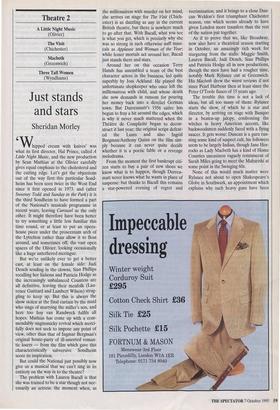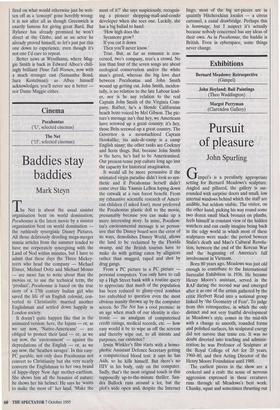Theatre 2
A Little Night Music (Olivier) The Visit (Chichester) Macbeth (Greenwich) Three Tall Women (Wyndhams)
Just stands and stars
Sheridan Morley
hipped cream with knives' was what its first director, Hal Prince, called A Little Night Music, and the new production by Sean Mathias at the Olivier carefully gives equal emphasis to the cholesterol and the cutting edge. Let's get the objections out of the way first: this particular Sond- heim has been seen twice in the West End since it first opened in 1973, and (after Sweeney Todd and Sunday in the Park) it is the third Sondheim to have formed a part of the National's musicals programme in recent years, leaving Carousel as the only other. It might therefore have been better to try something a little less familiar this time round, or at least to put an opera- house piece under the proscenium arch of the Lyttelton rather than allow it to float around, and sometimes off, the vast open spaces of the Olivier, looking occasionally like a huge untethered meringue.
But we're unlikely ever to get a better cast, at least on the female side: Judi Dench sending in the clowtis, Sian Phillips recalling her liaisons and Patricia Hodge as the increasingly unbalanced Countess are all definitive, leaving their menfolk (Lau- rence Guittard and Lambert Wilson) strug- gling to keep up. But this is always the show stolen at the final curtain by the maid who sings of marrying the miller's son, and here too Issy van Randwyck fulfils all hopes. Mathias has come up with a com- mendably ungimmicky revival which merci- fully does not seek to impose any point of view, other than that of Ingmar Bergman's original house-party of ill-assorted roman- tic losers — from the film which gave this characteristically subversive Sondheim score its inspiration.
But could the National just possibly now give us a musical that we can't sing in its entirety on the way in to the theatre?
The problem with Lauren Baca11 is that she was trained to be a star though not nec- essarily an actress: the moment when, as the millionairess with murder on her mind, she arrives on stage for The Visit (Chich- ester) is as dazzling as any in the current British theatre, but there is nowhere much to go after that. With Bacall, what you see is what you get, which is precisely why she was so strong in such otherwise naff musi- cals as Applause and Woman of the Year: while lesser mortals act around her, Bacall just stands there and stars.
Around her on this occasion Terry Hands has assembled a team of the best character actors in the business, led quite superbly by Joss Ackland. He played the unfortunate shopkeeper who once left the millionairess with child, and whose death she now demands in ransom for pouring her money back into a derelict German town. But Durrenmatt's 1956 satire has begun to fray a bit around the edges, which is why it never much mattered when the Theatre de Complicite began to decon- struct it last year; the original script defeat- ed the Lunts and also Ingrid Bergman/Anthony Quinn on the film sim- ply because it can never quite decide whether it is a poetic fable or a revenge melodrama.
From the moment the first bankrupt citi- zen starts to buy a pair of new shoes we know what is to happen, though Durren- matt never knows what he wants in place of suspense: but thanks to Bacall this remains a star-powered evening of regret and recrimination, and it brings to a close Dun- can Weldon's first triumphant Chichester season, one which seems already to have given London more transfers than the rest of the nation put together.
As if to prove that we, like Broadway, now also have a theatrical season starting in October, an amazingly rich week for stargazing from the stalls: Maggie Smith, Lauren Bacall, Judi Dench, Sian Phillips and Patricia Hodge all in new productions, though the men have had a rougher time, notably Mark Rylance out at Greenwich. His Macbeth drew the worst reviews if not since Pearl Harbour then at least since the Peter O'Toole fiasco of 15 years ago.
The trouble this time is not a lack of ideas, but all too many of them: Rylance starts the show, of which he is star and director, by arriving on stage with Banquo in a beaten-up jalopy, confronting the witches in heavy American accents, like backwoodsmen suddenly faced with a flying saucer. It gets worse: Duncan is a guru run- ning some kind of suspect cult, his followers seem to be largely Indian, though Jane Hor- rocks as Lady Macbeth has a kind of Home Counties uneasiness vaguely reminiscent of Sarah Miles going to meet the Maharishi at some point in the Swinging 60s.
None of this would much matter were Rylance not about to open Shakespeare's Globe in Southwark, an appointment which explains why such heavy guns have been fired on what would otherwise just be writ- ten off as a 'concept' gone horribly wrong: it is not after all as though Greenwich is exactly famous for giving great Bard. But Rylance has already promised he won't direct at the Globe, and as an actor he already proved himself, so let's just put this one down to experience, even though it's not one I'd care to repeat.
Better news at Wyndhams, where Mag- gie Smith is back in Edward Albee's chill- ingly brilliant Three Tall Women, now with a much stronger cast (Samantha Bond, Sara Kestelman): as Albee himself acknowledges, you'll never see it better — nor Dame Maggie either.











































































 Previous page
Previous page